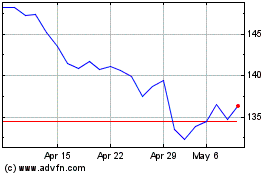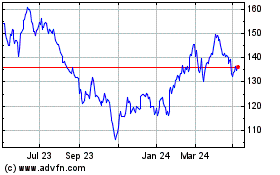By William Boston
BERLIN -- With empty dealerships across China and plunging
demand for cars, auto makers are accelerating the move to do more
business online and take their inventory pile directly to
home-bound customers.
Online sales of new cars are still such a small part of the
market that they barely register in official statistics. And
studies show that consumers, in China and elsewhere, still want to
walk into a dealership and kick the tires before plunking down a
pile of money for a new car.
But with a large number of Chinese consumers staying in their
homes because of the coronavirus epidemic, some manufacturers see
quarantined China, where visits to the dealership all but
disappeared in February, as a test bed for more aggressive online
sales.
Volkswagen AG has been training thousands of dealers to take
their pitch from the showroom to the chat room. In February,
Volkswagen tapped experts from Alibaba Group Holding Inc. and
Taobao to offer a three-day online training course for 50,000
salespeople, showing dealers how to use social media, create video
and live-stream events to reach customers outside the showroom.
The training covered about 90% of the staff at Volkswagen
dealerships and those of its joint-venture partners, said Michael
Mayer, head of sales and marketing for Volkswagen's passenger car
brands in China. Many of the auto maker's showrooms have been empty
or closed in recent weeks, Mr. Mayer said. Only a third of the
company's 2,100 dealerships across China are operating.
Volkswagen also is shifting some marketing resources away from
traditional sales channels. "It doesn't make sense to rent a
billboard now, so you shift resources online," Mr. Mayer said. "TV
advertising has also gone up; it's now more efficient because
people have more time to watch TV."
The coronavirus has pressured car makers to try new sales
approaches. In the first two weeks of February, new car sales fell
92%, according to the association of Chinese auto dealers.
For manufacturers, salvaging their China business during the
epidemic may depend on how well they have prepared their digital
showrooms.
In February, Geely Auto Group, a unit of Zhejiang Geely Holding
Group, launched an online ordering and home-delivery system,
providing a fully "contactless" auto purchasing and payment service
with the option of having cars delivered to customers at home.
Geely said that during the first week of operation, its online
sales orders jumped fivefold from the same period a year ago and
sales leads from Geely's website increased 75 times.
Audi AG, the luxury car maker owned by Volkswagen, said its
dealerships have remained open in China, but that "at the moment
their focus is on the online business."
A BMW spokeswoman said the Munich-based luxury-car maker is
providing dealers in China with an array of "digital toolboxes,"
including an online application that enables them to make video car
presentations and allows customers to view the car without leaving
home.
A Ford Motor Co. spokesman said the company is working with its
dealers in China to facilitate online sales when necessary,
allowing in some cases for financing to be dealt with via email.
When necessary, dealers are making home deliveries to customers who
can't come into the store.
Car companies have long tried to capitalize on the rise of
e-commerce, but that has often conflicted with their large
dealership networks. In some markets, like the U.S., franchise
agreements require them to only sell cars through dealers. U.S.
dealers have lobbied hard against Tesla Inc.'s direct-sales model,
blocking the electric car maker from several states.
Some car makers have tried online sales programs through their
dealership networks, like General Motors Co.'s Shop-Click-Drive,
but found that most car buyers still opt to shop in person for a
new vehicle. Online car sales are more prevalent in the used market
from startups like Carvana Co. and Shift Technologies Inc. and
China's Uxin Ltd.
European dealers also operate under a franchise system, but the
rules are more flexible than in the U.S. It is easier for companies
like Tesla, which only offers online sales, and third-party
multibrand online car dealers to do business online.
In China, there are large franchises but also independent
dealers, often part of larger chains, that sell many brands under
one roof.
In a 2019 study of Chinese consumers, the consulting group
McKinsey & Co. found that by the time consumers were ready to
buy a new car at a dealership, they had already obtained 90% of the
information they needed to make the purchase. Still, getting behind
the wheel in a car for a test drive remains the most important
factor for Chinese consumers when deciding whether to buy, the
study said, yet more than half of those surveyed would like dealers
to deliver the car to their homes for a test drive.
A survey of auto makers by KPMG LLP concluded that, world-wide,
30% to 50% of retail locations would disappear by 2025. "The
process is becoming much more digital," said Justin Benson, head of
KPMG's automotive research group in the U.K.
Regardless of the epidemic, Volkswagen is moving to completely
digitize its consumer sales, enabling anyone interested in
purchasing a car or a service, such as ride-hailing, to do so using
a Volkswagen app.
In Europe, Volkswagen spent two years negotiating with dealers
to agree on a model in 2018 by which they would be integrated in
the company's digital service channels and share 10% of online
revenues.
In China, where the company sells its namesake VW marque as well
as Audi, Skoda, Jetta, and Porsche, Volkswagen is partly building
on an online infrastructure. One Jetta dealer, for example,
conducted a virtual showroom tour online in December, with more
than 10,000 online viewers following the presentation.
Mr. Mayer said the company's past efforts are allowing VW to try
new tactics during the epidemic.
"This is what actually works now," he said. "You even have
people doing online test drives."
--Nora Naughton contributed to this article.
Write to William Boston at william.boston@wsj.com
(END) Dow Jones Newswires
March 01, 2020 05:44 ET (10:44 GMT)
Copyright (c) 2020 Dow Jones & Company, Inc.
Volkswagen (TG:VOW)
Historical Stock Chart
From Mar 2024 to Apr 2024

Volkswagen (TG:VOW)
Historical Stock Chart
From Apr 2023 to Apr 2024
